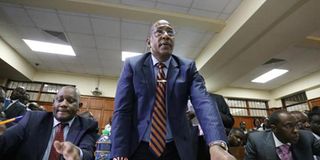DPP Tobiko absolves his office of blame in delayed prosecution of 'Chickengate' suspects

Director of Public Prosecutions Keriako Tobiko (centre) at the Milimani Law Courts on March 4, 2015 during the hearing of a case on Anglo Leasing. Mr Tobiko has said his office is not to blame for the delayed prosecution of suspects involved in the "Chickengate" scandal. PHOTO | FILE |
What you need to know:
Mr Tobiko argued his was the wrong office to blame because it does not investigate criminal incidents.
The DPP says criminal investigations can only be instituted based on evidence from the Inspector-General of Police or other legally mandated investigating agencies.
On January 8, 2016 the Southwark Crown Court in London fined Smith and Ouzman Ltd Sh330 million after being found guilty of bribing officials in Kenya and Mauritania.
Director of Public Prosecutions Keriako Tobiko has moved to absolve his office of blame for the delayed prosecution of those involved in the "Chickengate" affair even after a London Court fined a British company named in the bribery scandal.
In reacting to public criticism of the way his office handled the matter, Mr Tobiko argued his was the wrong office to blame because it does not investigate criminal incidents.
“The Director of Public Prosecutions' decision on whether or not to institute criminal proceedings is based on evidence submitted by the Inspector General of Police or any other legally mandated investigating agency,” Mr Tobiko said in a statement posted online last evening.
“The Director of Public prosecutions can therefore not institute criminal proceedings in the absence of evidence on the same.”
On Friday, the Southwark Crown Court in London ruled that Smith and Ouzman Ltd should pay a fine of Sh330 million after being found guilty of bribing officials in Kenya and Mauritania with £395,074 (Sh59.3 million) to earn printing contracts.
It was an additional fine that follows the jailing of the company’s former directors last February after they were found to have had a hand in the bribery scandal in which officials in Kenya are said to have pocketed millions coded as ‘chicken.’
KENYAN INVESTIGATIONS
Yet Kenyan authorities remain stuck, with little headway made in local investigations and with no one charged over the matter to date.
The Ethics and Anti-Corruption Commission, the agency charged with investigating the matter, has often asked for more time, even announcing it was awaiting evidence from the British Serious Fraud Office, which investigated the matter.
On Monday, the opposition Cord said it expected the government to ensure none of those mentioned in the scandal remains in office or survives prosecution.
“We know that one of the culprits who was in Kenya has since stepped aside and has been replaced in the Cabinet. We are hoping that the other culprits will also be taken,” said Tongaren MP Eseli Simiyu, who was part of a group of Cord MPs addressing journalists in Nairobi.
Top on the list of those who received bribes from Smith & Ouzman Limited include then Interim Independent Electoral Commission commissioner Davis Chirchir and CEO James Oswago and former Kenya National Examinations Council (Knec) boss Paul Wasanga, according to court filings.
The IIEC was later disbanded and its role taken over by the Independent Elections and Boundaries Commission (IEBC).
Mr Wasanga has since retired from the council. Mr Chirchir stepped aside over an unrelated corruption scandal and was replaced last November. Mr Oswango was charged in court with a different crime related to his time as CEO of the IEBC.
The EACC has since questioned all of them and the British company’s local agents, but none has been prosecuted.
On Monday, Kenyans criticised Kenya’s second-rate handling of the matter, with some accusing the DPP of "forgetting" it ever happened at all.
But Mr Tobiko was quick to absolve his name, saying he only acts on investigation results from other agencies.
“The Office of the Director of Public Prosecutions does not have the legal mandate to investigate criminal cases. ODDP’s (Office of the Director of Public Prosecutions) core mandate is prosecution, not investigation of criminal cases.”



